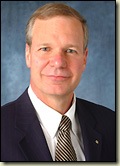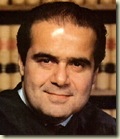CU Catching the Spirit (no, not the good French one from '68)
 Yesterday (May 13, 2008), the Wall Street Journal ran an article concerning University of Colorado at Boulder Chancellor "Bud" Peterson's desire to create an endowed chair for a Professor of Conservative Thought and Policy.
Yesterday (May 13, 2008), the Wall Street Journal ran an article concerning University of Colorado at Boulder Chancellor "Bud" Peterson's desire to create an endowed chair for a Professor of Conservative Thought and Policy.
Citing a 32-out-of-800 conservative-to-liberal ratio on the CU faculty, Peterson believes this chair will help to balance what is presumably a leftist college experience for the tens of thousands of undergrads longboarding around Boulder.
Peterson's proposal is problematic on several levels. First, it supposes that those who self-identify as liberal (or at least those who do not identify as conservative) cannot separate their politics from their teaching. As intellectuals, professors of conservative, moderate, and liberal politics represent multiple viewpoints and perspectives—that is good, ethical education. Apparently Chancellor Peterson does not believe this is happening with the 768 other faculty members, and apparently he believes that a hard-line conservative is the anti-dote. Aside from being blatantly anti-intellectual, Peterson's proposal is ludicrous.
 One need only consider Supreme Court Justice Antonin Scalia, appointed by President Reagan, to see illustrated perfectly the flaws in Peterson's argument. While Republicans often denounce "activists on the bench" (i.e. any judge appointed by a Democrat), the right seemingly has no problem with Scalia's opinion that Catholic officeholders (Scalia is himself a conservative Catholic) should resign their positions if they are asked to uphold public policies or laws that contradict doctrinal Catholicism. This direct articulation of secular government with non-secular ideology is antithetical to the Constitution of the United States, the document Justice Scalia is charged to defend.
One need only consider Supreme Court Justice Antonin Scalia, appointed by President Reagan, to see illustrated perfectly the flaws in Peterson's argument. While Republicans often denounce "activists on the bench" (i.e. any judge appointed by a Democrat), the right seemingly has no problem with Scalia's opinion that Catholic officeholders (Scalia is himself a conservative Catholic) should resign their positions if they are asked to uphold public policies or laws that contradict doctrinal Catholicism. This direct articulation of secular government with non-secular ideology is antithetical to the Constitution of the United States, the document Justice Scalia is charged to defend.
In response to Chancellor Peterson's statement, Republican congressman Tom Tancredo (R-Colorado) issued a press release that inadvertently helped the cause of actual intellectuals everywhere. A former member of the Independence Institute, a libertarian think tank in Golden, CO; a current member of both the House Foreign Affairs and Natural Resources Committees; and the founder and former chairman of the bipartisan House Immigration Reform Caucus, Tancredo has introduced enlightened ideas (such as running a fence along the entire U.S.-Mexico border [Wait, didn't a former Republican president named Ronald Reagan utter the famous phrases "open this [the Brandenburg] gate" and "tear down this wall!"—Ed.1] into 21st century democracy.
According to the Denver Post,
Republican congressman Tom Tancredo has fired off a wisecracking press release saying he wants to be a professor of conservative politics at the University of Colorado — a school often criticized by conservatives as being too liberal.
The outspoken opponent of illegal immigration is suggesting classes in "English Only 101" and "American Assimilation." He's also proposing a 20-foot-high fence around the border of the university's Boulder campus.
When I teach academic writing, I always tell my students to analyze and interpret each piece of evidence they cite, as evidence rarely argues for itself. In the case of Tancredo's comments, they are the exception to the rule.
Certainly, Tancredo (as a self-defined conservative) not only trivializes Chancellor Peterson's proposition, but also illustrates the danger in hiring someone for his or her ideological position.
Part of the problem comes from the concerted effort on the part of the right to demonize the word "liberal," and part of the problem comes from the elusive definition of what "liberalism" really means in common usage. For instance, the WSJ tries to use the fact that "the campus hot-dog stand sells tofu wieners" as evidence of liberalism (if we admit this as valid, can we also admit that the $5 dollar price point equally suggests that the hot dog stand is pro-capitalist?). People eat tofu for any number of reasons that have nothing to do with the lever they pull in the voting booth (if, in fact, they choose to vote).
The WSJ allows Peterson to define futher "liberalism" when it reports:
A college that champions diversity, he believes, must think beyond courses in gay literature, Chicano studies and feminist theory. "We should also talk about intellectual diversity," he says.
Wait, what? After reading that, one might feel a bit like a post-dart Frank the Tank:
According to Peterson, courses in queer theory, cultural studies, and gender studies do not represent intellectual diversity? I suppose someone should tell all the pundits covering the Democratic race for the presidential nomination that America's normative position on these issues is one of equality for those minority cultures; wow, I'm relieved to know that voters aren't making voting decision based upon Senator Clinton's gender or Senator Obama's race. And the fact checker at the Washington Post must be asleep at the switch, because the May 13, 2008 article "Racist Incidents Give Some Obama Campaigners Pause" is apparently loaded with inaccuracies:
Victoria Switzer, a retired social studies teacher, was on phone-bank duty one night during the Pennsylvania primary campaign. One night was all she could take: "It wasn't pretty." She made 60 calls to prospective voters in Susquehanna County, her home county, which is 98 percent white. The responses were dispiriting. One caller, Switzer remembers, said he couldn't possibly vote for Obama and concluded: "Hang that darky from a tree!"
Documentary filmmaker Rory Kennedy, the daughter of the late Robert F. Kennedy, said she, too, came across "a lot of racism" when campaigning for Obama in Pennsylvania. One Pittsburgh union organizer told her he would not vote for Obama because he is black, and a white voter, she said, offered this frank reason for not backing Obama: "White people look out for white people, and black people look out for black people."
I sure hope a conservative Republican perspective can set those people straight and restore the balance that Chancellor Peterson seems to think exists on the CU-Boulder campus and in this country.
1I suppose President George W. Bush has learned a few things about foreign relations, diplomacy, and sovereignty from President Reagan when Reagan asked Gorbachev, President of the Soviet Union from 1985-1991, to tear down a wall in another country.




No comments:
Post a Comment